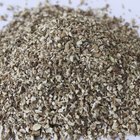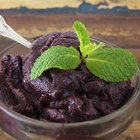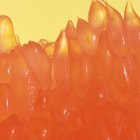
Alferova/iStock/Getty Images
Eczema, also known as atopic dermatitis, is an itchy inflammation of the skin. Eczema can be found anywhere on the body, but classically it effects the area behind the knee, the upper chest, ankles, face, neck and arms. Grapefruit seed extract is not an essential nutrient but may be beneficial for certain health conditions such as eczema. A healthcare professional should always be consulted before taking any grapefruit extract supplements.
Grapefruit Extract
Grapefruit seed extract, also known as citrus seed extract, is derived from the pulp, seeds and white membranes of the grapefruit. Grapefruit extract is available as a supplement in liquid, tablet or capsule forms. According to the University of Maryland, grapefruit extract may have antiviral, anti-fungal and antibacterial properties. It may also help boost the immune system.
Eczema
Eczema, may be accompanied by hay fever or asthma and can first appear later in life but is most often seen in infants and children. The cause of eczema is unknown, but according to the Mayo Clinic, it may be caused by a malfunction in the body's immune system, combined with the condition of dry, irritated skin. Eczema sufferers may also have bacteria called Staphylococcus aureus growing on the skin, which can intensify symptoms and increase the severity of the disease. Typical symptoms of eczema include, itching, thickened or cracked skin, and red skin sensitive from scratching.
Grapefruit Extract and Eczema
In a study published in the “Journal of Orthomolecular Medicine,” researchers studied the effect of grapefruit extract on 25 eczema patients, aged between 16 and 41 years old. The team commented that recurrent bacterial and fungal infections have a strong association with eczema. A group of 10 patients were given 2 drops of grapefruit extract in 200 mL of water twice daily for a month. The authors noted that because of the bitter taste of the grapefruit extract, it was difficult to get the patients to take a higher dose; the team therefore put another group of 15 patients on a 3 x 50 mg capsule of grapefruit extract daily for a month. The team found that grapefruit extract helped improve constipation, flatulence and abdominal discomfort in eczema sufferers and inhibited the growth of Staphylococcus aureus and so may help improve eczema symptoms such as itchy skin.
Eczema patients should consult a doctor before taking any grapefruit extract supplements.
Considerations
According to the University of Michigan, although there are no known side effects when taking grapefruit extract, this product does interact with a number of common medications, such as the blood thinning medication warfarin. Patients on prescribed medications should therefore check with a doctor before taking any grapefruit extract supplements.
Related Articles

What Are the Benefits of Ashwagandha in ...

Can Borage Oil Help Acne?

Dandelion Root for Reduced Acne Symptoms

Acai Berry & Acne

Uses for Castor Oil on the Skin

Are There Herbal Treatments for ...

How to Reduce Acne Inflammation

List of Retinoids

What Is Aloe Good For?

Is Listerine Effective in Treating ...

Grapefruit Seed Extract for Seborrheic ...

Golden Flax Seed Vs. Dark Flax Seed

Benefits of Shea Butter and Coconut Oil ...

Peeling the Spiny Chayote Squash

Ingredients of Accutane

Arnica for Acne

Recommended Daily Dosage of Saw ...

Aloe Vera & Seborrheic Dermatitis

Tazorac Cream & What it Does for Acne

Traditional Uses of Cuscuta
References
- University of Maryland: Histoplasmosis
- “Journal of Orthomolecular Medicine”: Oral citrus seed extract in atopic eczema: in vitro and in vivo studies on intestinal microflora: Ionescu G, Kiehl F, Wichmann-Kunz F, et al. 1990
- University of Michigan: Warfarin
Writer Bio
Debbie Hillman is a qualified nutritionist and massage therapist based in the U.K. She has been writing about healthy diets and lifestyle for the past eight years. Her work has been published in both trade and consumer publications.
Photo Credits
Alferova/iStock/Getty Images